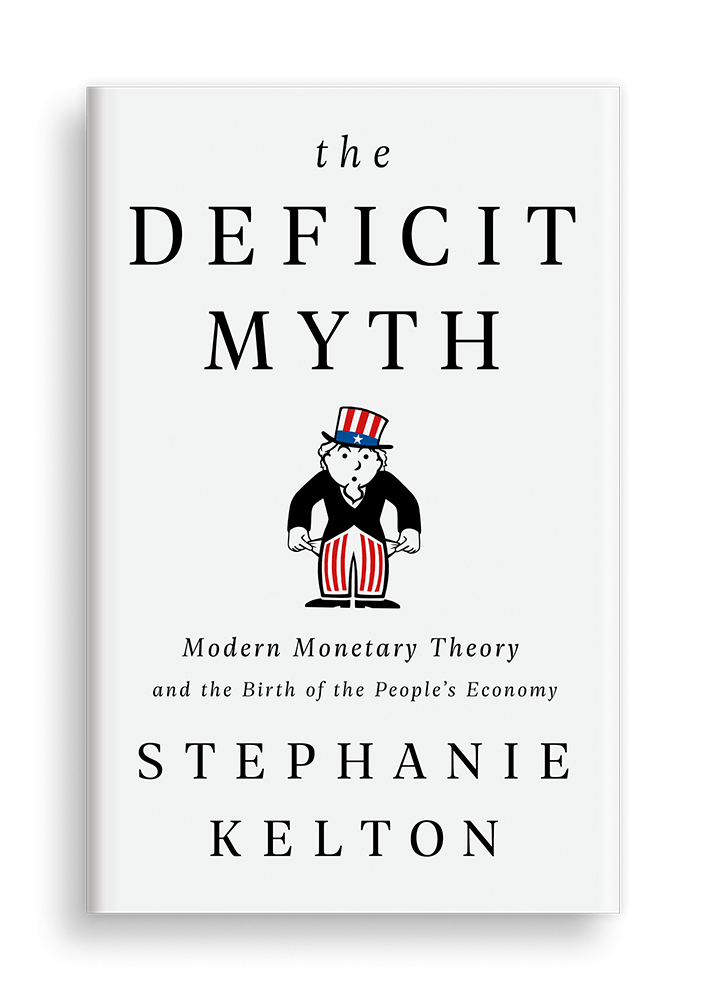#ModernMonetaryTheory is an economic lens for understanding how money works. It starts from the commonsense assertion that national governments are money-issuers, and the rest of us are money users, and that money works differently when you are in charge of creating it.
1/
1/
But this challenges accepted wisdom, like the idea that national deficits cause inflation and saddle our descendants with debt. If governments are the source of money, then they don& #39;t tax us in order to spend. They spend (which puts money into the economy) and then tax back.
2/
2/
If the government runs a "balanced budget" that means it& #39;s taxing as much money of out existence as it is spending into existence, leaving behind no money for the rest of us to save or spend. Balanced budgets starve the private sector of the money it needs to operate.
3/
3/
When that happens, banks create private money (lending money that they don& #39;t have on deposit, something that they are allowed to do as part of their deal with the national government), and then they get to charge interest for those loans.
4/
4/
So the finance sector hates public money - which benefits everyone - and loves private money - which benefits them. But of course, banks inevitably overspend and since they aren& #39;t national governments, they risk defaulting, so they need public money to bail them out.
5/
5/
Governments can& #39;t default on debts owed in currencies they issue. They just type more zeroes into a spreadsheet at the national bank and they can pay off any debt they want. They are not "monetarily constrained."
6/
6/
The constraint on governments is RESOURCES, not money. If the government tries to buy things the private sector is using, it gets into a bidding war and prices go up. That& #39;s inflation.
7/
7/
Likewise, if the private sector has too much money, it bids against itself and again, prices go up - inflation (think of the 2008 crisis, when banks created too much money and we got a speculative housing bubble, leaving governments to create money to bail them out).
8/
8/
Governments don& #39;t tax to balance budgets: they tax to remove money from the system to fight inflation. Progressive taxation - higher taxes on the rich - minimize the privation of having some of your money annihilated, and it also weakens the 1%& #39;s power to influence politics.
9/
9/
(Governments have done other things to fight inflation when they felt the need to buy things the private sector wanted, like during WWII: war bonds that locked up the money pumped into economy with war spending, and rationing, which limited bids on war materiel).
10/
10/
MMT has seen many vindications since the 2008 crisis, when the bailouts didn& #39;t produce the inflation we& #39;d been warned of. Then, when the #TaxScam passed and left the fed budget trillions in deficit, we were warned that the USG had no more resources to fight a future crisis.
11/
11/
But when the crisis hit, Congress was able to spend trillions into existence with the stroke of a pen, without inflation, because the private sector no longer wanted the labor of a large fraction of the workforce. The existence of the tax deficit was irrelevant.
12/
12/
The reason to be alarmed by the deficit left behind by the tax bill is that it will make rich people richer, not that it will deprive the federal government of money. That& #39;s like saying giving free Itunes gift cards to plutes starves Apple of cards for the rest of us.
13/
13/
All of this is beautifully explained in a new @Marketplace interview with @StephanieKelton, MMT& #39;s most articulate, thoughtful and knowledgable spokesperson.
https://www.marketplace.org/shows/make-me-smart-with-kai-and-molly/maybe-modern-monetary-theory-is-an-answer-to-the-covid-19-economic-crisis/
14/">https://www.marketplace.org/shows/mak...
https://www.marketplace.org/shows/make-me-smart-with-kai-and-molly/maybe-modern-monetary-theory-is-an-answer-to-the-covid-19-economic-crisis/
14/">https://www.marketplace.org/shows/mak...
Kelton& #39;s interview is tied to her upcoming (June) release, "The Deficit Myth." The book couldn& #39;t be more timely. With the private sector no longer interested in the labor of so many of us, nor the goods we can produce, MMT is the lens we need.
https://stephaniekelton.com/book/
eof/">https://stephaniekelton.com/book/&quo...
https://stephaniekelton.com/book/
eof/">https://stephaniekelton.com/book/&quo...

 Read on Twitter
Read on Twitter


